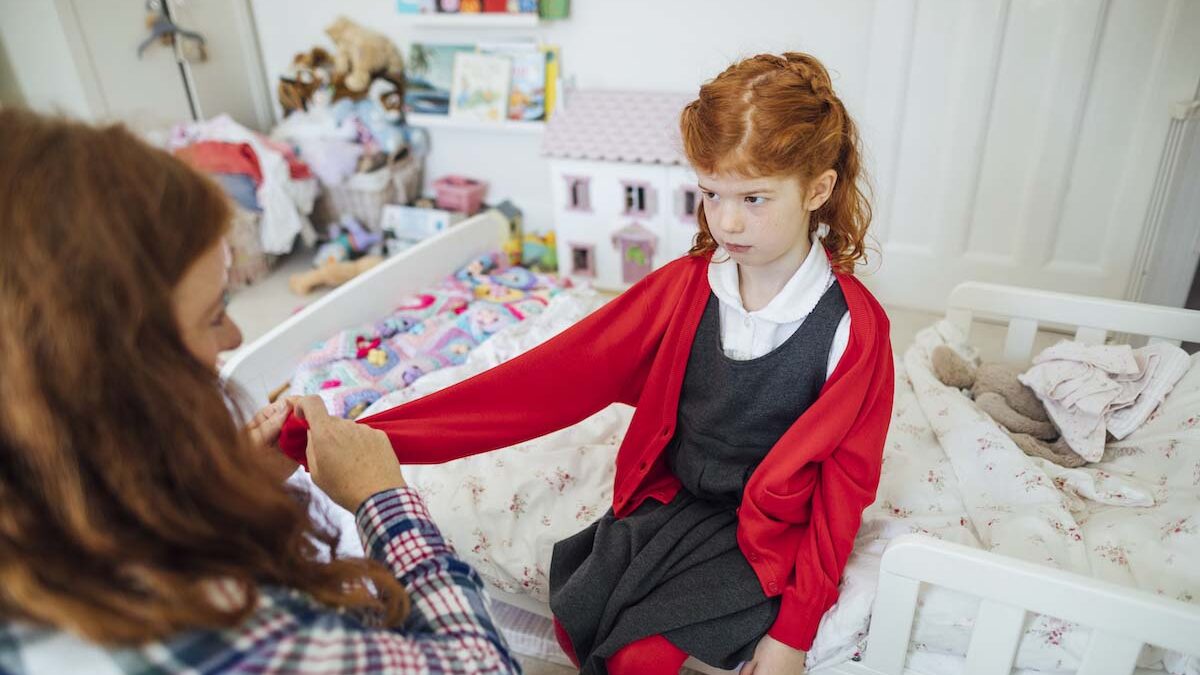A psychologist offers six tips to help if your child is one of the thousands who refuses to go to school every morning.
If the recent Senate inquiry is anything to go by, school refusal is a very real and serious problem—and it’s getting worse.
School refusal is sometimes referred to as school phobia or school anxiety. Whatever name it goes by, it’s essentially means having difficulty getting your school-aged child to attend school.
School refusal symptoms
Sometimes, school refusal isn’t as obvious as having a child refuse to get dressed, get into the car or even walk through the school gates. The following signs may also indicate you have a child struggling with going to school:
- Sleeplessness
- Talking about not wanting to go to school the night before
- Pretending to be sick
- Actually feeling sick (physical symptoms include vomiting, stomach aches, dizziness)
- Excessive worrying
There will also be school refusers who make it to school, but will then need to be picked up in the middle of the school day. Younger children may also stick to teachers, refusing to interact with other kids.
What is the psychology for school refusal?
As psychologist Collett Smart points out, it’s often not because your child is being defiant or obstinate when they refuse to go to school. It also may not mean they’re being bullied or that their school environment is less than ideal. Sometimes, a child’s school refusal is linked to a general fear of the unknowns. These include:
- Social anxiety or fear of social isolation
- Doing badly at school
- Separation anxiety
In this video, Collet shares how to help a child with separation anxiety at school.
For older children, not wanting to go to school may also be linked to mental health conditions such as depression and anxiety.
However, if your child has always loved school and is only just refusing to do so, ask yourself if something has changed at home. Perhaps you’ve moved house or something bad has happened to a family member. Children can sometimes be highly sensitive to changes, which can cause some level of anxiety.
Pandemic screen time causing an increase in school refusal cases
The increase in screen time use during the pandemic is also thought to be a contributing factor for the growing number of school refusal behaviour in young people.
“There’s been a lot more screen time and I suppose the potential for some of those kids to become, unfortunately, addicted to those screens,” University of the Sunshine Coast psychology lecturer and researcher Rachel Sharman told ABC News.
Parents who had to resort to screen time at the height of lockdown should avoid blaming themselves though. It’s important to remember that it was a period of “surviving, not thriving” when the world shut down and full-time working parents were also expected to become their child’s school teacher.
What parents need to focus on now is to manage screen time well, not ban it completely. Screen time is only detrimental when done in excess. This means children can still enjoy screen time with the right boundaries.
Some children may also become attached to their screens in an attempt to hide or ignore any underlying fears or worries. Try to find out what these are to help with their screen addiction.
What can a parent do if a child refuses to go to school?
School refusal often results from a young person having high levels of anxiety. Gently overcoming this will require both practical and psychological solutions. Collett offers 6 tips below and in this video.
1. Acknowledge their fears and find solutions
Help children become aware of what’s happening with their bodies, linking it to the feelings they are experiencing. For example, a physical illness may not be viral but the result of being scared of going to school.
“Help them find positive ways to become ‘the boss of the worry monster’,” Collett suggests. “This may involve getting them to look at things more realistically, instead of dwelling on the terrible ‘what-ifs’.”
2. Get organised the night before
Some children may feel less emotional distress if you get them ready for school the night before. Be positive and offer plenty of encouragement when you pack their bags and lay out their school uniform at home.
“Often, it’s the mayhem of the morning that builds up the anxiety,” says Collett.
3. Celebrate the small wins
Break down what you need to get your child ready on a school day. It could start with getting dressed for school, then getting into the car and eventually walking through that school gate. Remember that each step may take time and require working through with a mental health professional.
4. Involve the school
Improving your child’s school attendance will require a strong partnership with staff. Ask if a trusted or favourite teacher can meet your child at your car or near the entrance (discreetly, away from other students) during drop-off.
5. Create a buddy system
Alternatively, get your child’s best friend at school to walk in with them.
6. Help them recognise their efforts
Don’t just praise them for taking a step in the right direction, help them recognise what they did. “Get them to recognise and draw on what they did well,” says Collett. “Ask them how they managed to do what they did, then encourage them to do more of it next time.”
What are the long-term consequences of school refusal?
It’s important to address school reluctance as soon as possible. Long-term consequences include impacting the type of relationships children have at school. It will also have an effect on their academic performance.
School refusal can be a highly complex and distressing situation. Seek professional help if you need to.
How helpful was this article?
Click on a star to rate it!
0 / 5. 0
Be the first to rate this post!
Melody Tan
Related posts
Subscribe
Receive personalised articles from experts and wellness inspiration weekly!


